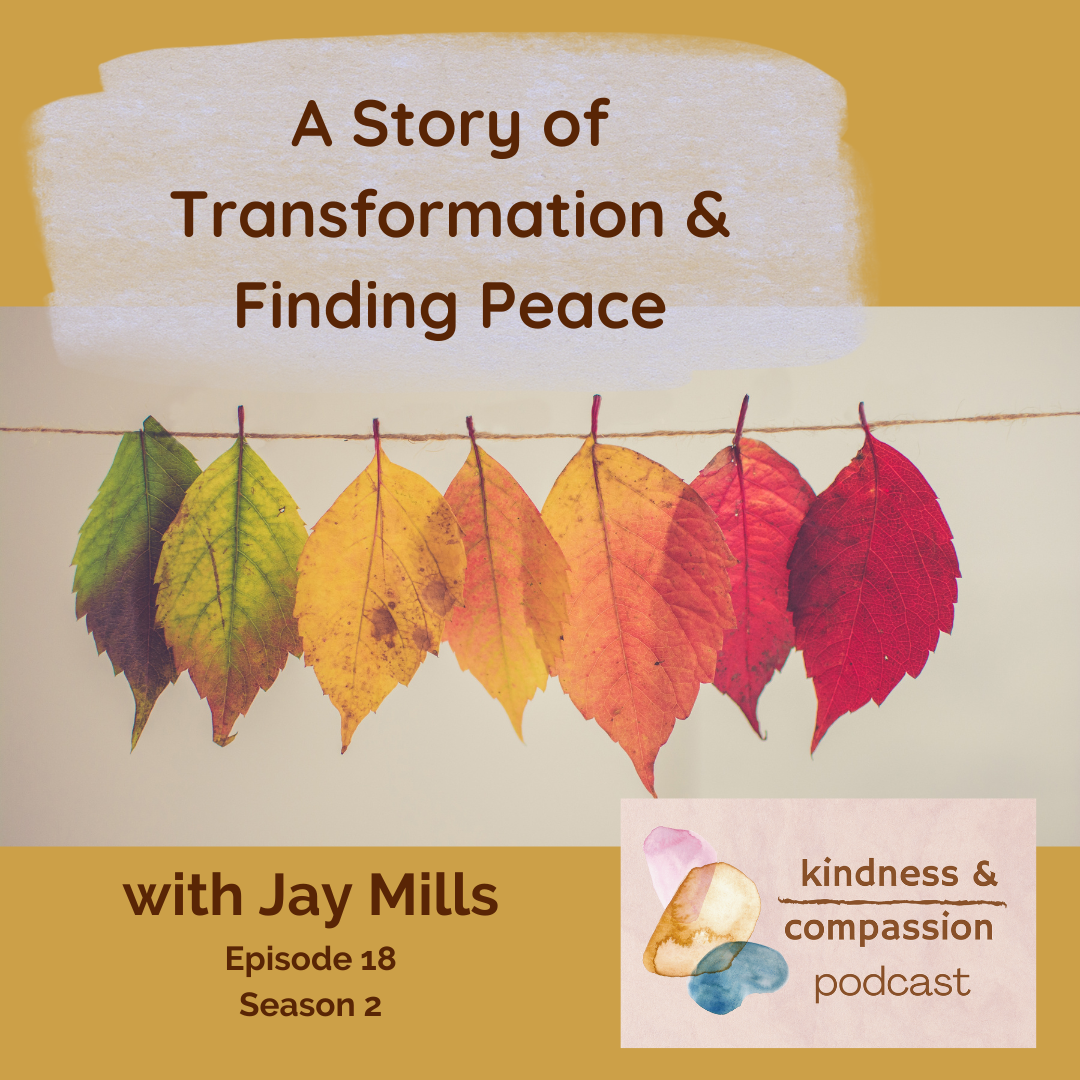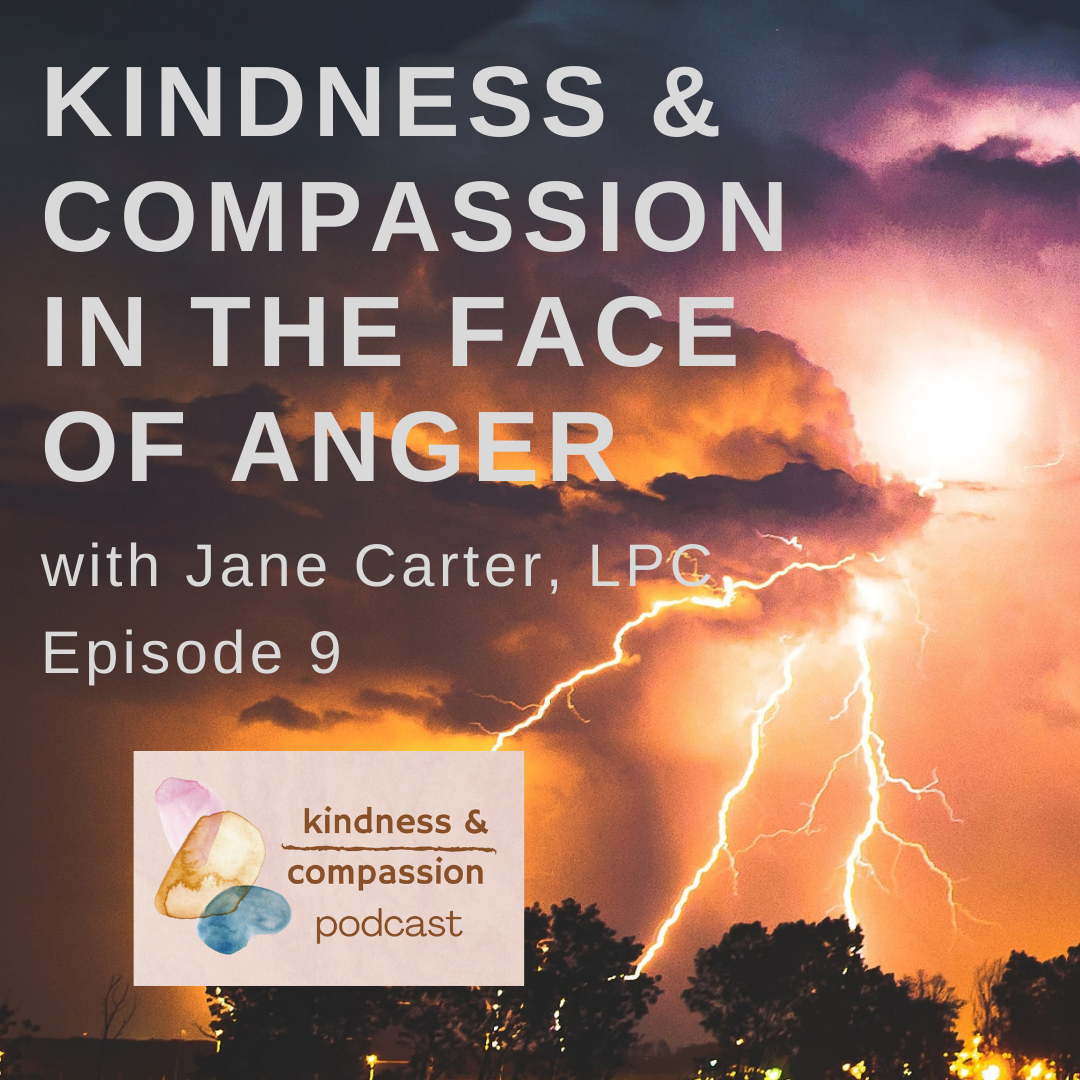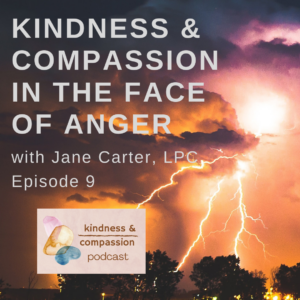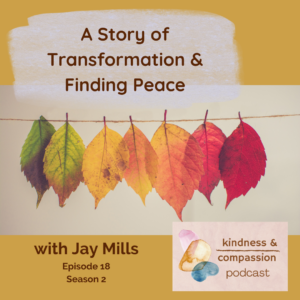
In this episode Gordon talks with The Rev. Jay Mills about his life journey of transformation and how he has changed his mind and values over the years. Jay shares how his life changed through his involvement in a 12-step program and his reconciliation with his past. Gordon has known Jay for close to 20 years. Jay was originally one of Gordon’s priests. Gordon is currently a clergy person in the Episcopal church and Jay is retired. As Jay tells his story you will find his life is an example of kindness and compassion.
Jay Mills Early Years
 The Rev. Jay Mills was raised in a middle-class home with parents that were reasonably good parents. And I ended up getting sexually assaulted when I was 12 years old, and my life very quickly unraveled. Jay started doing drugs and alcohol heavily. He ended up being addicted very young. He was also a really angry kid with a lot of violence. He lived that way until he was about 21, where he went through a conversion through the ministries of Campus Crusade for Christ. While he does not agree with their theology now, he says “I owe them my life cause as I’ve often said, if I waited for the Episcopal Church to evangelize me, I’ve died in a drug house.
The Rev. Jay Mills was raised in a middle-class home with parents that were reasonably good parents. And I ended up getting sexually assaulted when I was 12 years old, and my life very quickly unraveled. Jay started doing drugs and alcohol heavily. He ended up being addicted very young. He was also a really angry kid with a lot of violence. He lived that way until he was about 21, where he went through a conversion through the ministries of Campus Crusade for Christ. While he does not agree with their theology now, he says “I owe them my life cause as I’ve often said, if I waited for the Episcopal Church to evangelize me, I’ve died in a drug house.
He was a camp counselor not long after that. He had an experience that where he oversaw several kids. They were in the back of his car, and they flipped off a local guy. And the guy followed him into Burger King. He wanted to fight. “I just looked at him and I said, “I can fight you. I’m a Christian.” Jay says at that moment he understood exactly what Jesus was talking about. Bless your enemies. Jesus was calling me to be a person of peace.
Gun Culture in America
Understanding the virtues of humility, love, and joy, and humility have been transformative in his life. for me. In my later years was the American gun culture. He went through a lent where he didn’t carry and found it really freeing. Through that experience he ended up selling all his guns. Getting rid of them was very freeing. “There’s just too much killing going on in the United States … and Jesus really did call me to be a person of peace…”
Jay’s Process of Change
“If the Jesus movement in which I was converted, had a dark side, it evolved very quickly into conservative politics.” He assumed that he had to partake in that “dark side”, and it didn’t fit. Jay describes himself as “a campus radical wannabe in the sixties and early seventies.” He never fit that very well and has slowly grown out of it. One of the biggest changes he made was in gay and lesbian people. Jay was reported to the head of the Integrity chapter, which was the gay and lesbian group in the Episcopal church at the time about 15 years ago now. Jay had an interchange with a parishioner who was gay. The head of the group and Jay met. At the time, Jay believed homosexuality was a sin. And despite our differences, we became friends. I was challenged during our meeting to do my research.
In seminary, Jay learned to read Hebrew and Greek. So, he did his research. And to his surprise, it changed his mind. He came to believe that we’ve been wrong about homosexuality. Those passages that report being anti-gay are not necessarily that way when read in the original Greek or when read in context or in when read with their culture in mind.
As Jay explains, the story of Sodom and Gamora is not about gay love. It’s about rape. And the lack of hospitality of the people of Sodom and Gamora. And that hospitality to this day is one of the cardinal virtues of the Middle East. And the condemnation in Romans has more to do with the worship of the god’s sibling than homosexuality. Jay had promised his friend, “If I ever changed my mind I would go to bat for them.” And he did and for several years. At the Dawson Conventions, every year he would end up speaking in favor of changing our mind about it.
The Process of Making Peace
Gordon asked Jay a Question about the process of making peace with yourself. Jay said “It’s interesting. I am. A member of a 12-step group having to do with alcohol and drugs. I was working with a sponsor and I always had a lot of anger and rage and it came through spiritually and emotionally in my ministry, unfortunately, from time to time, and he and I were working on the steps.”
Jay continues “If you don’t know the steps, the four steps you write down all the things you’ve done. Basically, the resentments you have, the things you’ve done. Eventually, you get to the people you’ve hurt in the fifth and sixth steps. And he had a dog that he’d rescued from the fights, a pit bull, and she wanted nothing to do for me.”
Jay notes “She could read all that anger and rage that I carried around in me. And at the very end of working the fourth and fifth and sixth steps, we knelt down to pray. And that dog came up and leaned up against me because unbeknownst to me, God had lifted all that rage and anger out of me. Cuz I, I, when I was a young man, I would beat people till they quit moving.”
After working through those steps and the prayer Jay expressed “And it just, it’s never been there since. It’s, God simply took it.”
Jay said he thinks the first thing to recognize is that it almost always it comes out of trauma in childhood. In that case, he usually refers them to a therapist who can really help them work with it. Another option is a 12-step group if they have an alcohol or drug addiction problem. 12-step groups are a great place, to work on all that because the steps really strip you down and make you face yourself. And you don’t carry that garbage around with you anymore. There are solutions and “you don’t have to go around mad at the world.”
Wrestling with Fears
“I still wrestle with the fears.” Jay was reading Richard Ross commentary on the Sermon on the Mount. The first five chapters are the historical background to the Ministry of Jesus. He said he’s got a list of things he affirms. One of those is that God is on your side. One of the later ones is that everything is heading somewhere good. Ross makes the comment that the world is a safe place. Jay said “And I semi-believe that. I also believe that it could be a very dangerous place. And that’s where the promises of the call of Jesus to love those who persecute you to love your enemies. Where the rubber really meets the. I don’t want to have someone slap me on the face and have to turn the other cheek.”
Jay continues, “I fear it. But I, but that’s what I’m called to. And ultimately I’ve found whatever traumatic things happen to me, God uses them as gifts for serving other people in the end. So, I can face the fears with a certain amount of hope that God will do something good.”
In the AA and NA and other 12-step groups, the premise is that if you’re going to get sobriety, you’re going to have to give it away and help other people and help other people in other ways besides just. Self-centered fears are at the core of all the stuff that drives us. Jay says he was one of the “baddest guys on the block” as a young adolescent and early 20-year-old and was scared all the time. “Nobody knew it and I couldn’t afford to help other people. I can now, I can learn to go beyond myself, and my self-centered fears, and reach out.”
Ways to live with more compassion and Kindness
Jay wants us to practice kindness towards ourselves. The kind of kindness that God practices. Jay thinks an awful lot of American religion sees God as an ogre waiting to swat them down. “I just don’t believe that God is revealed except in a few places in the Bible that I just don’t pay attention to.” Actually, there’s a saying in the 12-step programs, “Fake it till you make it.” Act compassionate until you feel compassionate. There are actions that drive our feelings, not the other way around. When we’re stuck in fear-based stuff, our feelings drive our actions. But to learn to act first and let the feelings follow, which Jay says is vital.
Another way to live with compassion and kindness is to avoid isolation. Because our minds can conjure up all kinds of fears and self-doubt that have no connection to reality whatsoever. And then we can get stuck in ourselves and lose the compassion and mercy that we are called to live.
“Where religion is important, where Christianity and all of that is that there’s an, there’s a different way of living into it, of understanding.
And anytime you see the words “belief in, I believe or belief in” in the New Testament, read the word “trust” and it’ll completely revolutionize how you read the New Testament.
Although officially “retired” Jay is currently serving as an Associate Rector at St. Margaret’s Episcopal Church in Waxhaw, NC. Jay helps with pastoral care and still enjoys teaching, Biblical research, and occasional fly fishing. He and his wife Karen have two adult children, and 5 grandchildren.
[00:00:00] Jay Mills: Okay. Hi, I'm Jay Mills. I'm happy to be on the Kindness and Compassion broadcast with Gordon Brewer and talk about some things that have happened in my life.
[00:00:18] Gordon Brewer: Well, hello everyone and welcome again to the podcast and I'm so glad and really very thankful that my good dear friend, the Reverend j Mills is with me here today. Welcome, Jay. Thank you. Glad to be here. Yes. And so Jay and I have probably known each other probably close to 20 years. Is that, would that be our Yeah, 94.
Yeah. So we've known each other a long time and been through a lot together. Just, uh, when Jay was, uh, Jay was, uh, originally one of my priests in the past. And, um, as I've shared on other shows, I'm, I'm a clergy person in the Episcopal church and Jay is retired. We're going back to working, but, um, I'm gonna let Jay kind of tell his story because I think one of the things that I know about Jay is, is that his story very much lives into this whole concept of kindness and compassion.
So, Jay, tell folks a little bit more about yourself and how you've landed where you've landed. How
[00:01:22] Jay Mills: far, far back you
[00:01:23] Gordon Brewer: want me to go? Yeah. . So you start where you feel like you wanna
[00:01:27] Jay Mills: start. Okay. Well, I, I, um, was raised in a middle class home, uh, with parents that were re reasonable good parents. Um, And I ended up getting sexually assaulted when I was 12 years old, and my life very quickly unraveled.
I started doing drugs heavily and alcohol, and ended up being addicted very, very young and was also a really angry kid with a lot of violence. And, um, was that way until, until I was about 21, where I went through a conversion through the ministries of Campus Crusade for Christ, which is a very fundamentalist campus organization.
Uh, I don't agree with her theology at all now, but I owe them my life. Cause as I've often said, if I waited for the Episcopal Church to evangelize me, I've died in a drug house. , um, sadly. Mm-hmm. . It was, it was the real deal. I, I, uh, one of the stories I tell about the change that happened in me, I was a camp counselor not long after that, and I was in charge of several kids who were in the back of my car and they flipped off a local guy, uh, in this camp, conference center town called Romney.
And the guy followed me into a, into a. Burger King, I think, and, uh, wanted to fight. I just looked at him and I said, I can fight you. I'm a c. Um, and, and I understood exactly what Jesus was talking about in, in the lessons for this coming, uh, all Saint Sunday. Bless your enemies. A player for those who persecute you.
Um, uh, he, he was calling me to be a person of of peace. Umhmm . And, um, I've, I've had good days in that. I've had bad days in that. Um, and, um, I've undergone a pretty significant change in the last year, um, primarily, uh, through the auspices of the Anglican or Episcopal Society in St. Francis. Uh, I'm affiliating as a third order Franciscan, which is a lay order of Franciscan's, and they, they stress the three.
Virtues of, of, um, uh, humility, love, and joy, uh, which are humility. Part I, I've got pretty well, the love part, I've got less well and the joy part I have to really struggle with. Mm-hmm. . Um, but it's, it's been transformative for me. Um, I was one, one of the things I drifted back into, In my later years was, was the gun culture at America.
And, um, went through a lent where I, where I didn't carry, um, and found it really freeing and ended up selling all my guns and, and tickled to death to be done with them. There's just too much killing going on in the United States and I don't wanna be. Uh, and, and Jesus really did call me to be a person of peace, and that doesn't include that mm-hmm.
So that, that, that was a, that's, that's been a big change in the last year. Yeah.
[00:04:50] Gordon Brewer: Yeah. That's about it. Yeah. Well, it's a, And knowing, and as I mentioned at the beginning, and knowing you, Jay, for as long as I've known you, I've kinda seen your transformation, um, from when you first came where Jay was. Had lived here in the same town that I live in Kingsport, Tennessee.
And, um, our area is a fairly conservative, uh, pretty right wing area here. Oh, yeah. And, and I know that you went through some other transformations and just kind of changing your mind about some of those conservative views and. Ways of seeing things. Um, do you mind sharing just kind of what that process was like for you and some of the things that kinda led to that change of mind?
[00:05:37] Jay Mills: Well, if the, if the, the Jesus movement in which I was converted. Had a dark side. It, it evolved very quickly into conservative, uh, conservative politics rather. Uh, and I made the assumption that I had to partake in that mm-hmm. and it didn't fit. I was, uh, campus radical wannabe in, in the sixties and early seventies.
Uh, and I never fit that very well and, I've slowly grown out of it and been willing to grow out of it. Um, and the, the, one of the biggest changes I made was in the area of gay and lesbian people. Um, I, I was reported to the head of the Integrity chapter, which was the gay and lesbian group in the Episcopal church at the time, Oh, about 15 years ago now.
A, as I had had an interchange with a parishioner who was gay. And, um, the head of the group and I met and we became, in spite of our differences, I, I thought homosexuality was a sin. And, uh, in spite of our differences, we became friends. And she challenged me during ent. ENT seems to be always the time when I do all this big changing.
Mm-hmm. challenged me during lent to do the research. Again, I was for. In seminary, I got to learn to read Hebrew and Greek, um, and did the research. Left wing research, right wing research, exo Jesus of the passages. And to my surprise, changed my mind. Um, and came to believe that we've been wrong about homosexuality and that those passages that report to be, um, Anti-gay are not necessarily that way when red in the original Greek or when red in context.
Culturally. Um, for example, the story of Sodom and Gamora is not about gay love. It's about rape. Um, and, and, and the lack of hospitality of the people of, of Sodom and Gamora. And, and that's hospitality to this day is the, one of the cardinal virtues of the Middle East. Um, And the, the, the condemnation in Romans, in the beginning of Romans, uh, I, I think that has more to do with the worship of the god's sibling than the, than than homosexuality.
Mm-hmm. . Um, and I promised my friend our very first conversation, If I ever changed my mind, I, I would go to bat for them. And I did and, uh, for, for several years was on the other side of it than my bishop. And at Dawson Conventions, every year would end up speaking in favor of changing our mind about it and mm-hmm.
and he would not relent and we managed to remain friends because I'm, I, by then, I'd learn to not be so aggressive and, and. And spiritually, emotionally violent when I said and did things. Um, but it was a, it was a huge transformation.
[00:08:47] Gordon Brewer: Yes.
[00:08:47] Jay Mills: Yes. So it was funny. I'd always been blessed with gay friends.
Mm-hmm. . Um, but I didn't know the barrier that that had put up. I, I made amends to all my gay friends and, and it, it changed the relationships enormously with a couple of them.
[00:09:03] Gordon Brewer: Right. Yeah. So that's kind of the Ulta. How did, um, I don't, I don't know. You, you might have kind of answered this question, but when I think about kindness and compassion, I guess the word peace comes to to mind.
But what, how did you, what was the, the process of making peace with yourself about kind of those past things plus how you handle 'em now?
[00:09:30] Jay Mills: Well, it's interesting. I, I am. Uh, a member of a 12 step group having to do with alcohol and drugs, and I was working with a sponsor and I always had a lot of anger and rage and it, and it came through, uh, spiritually and emotionally in my ministry, unfortunately, from time to time, and he and I were working on the steps.
If you don't know the steps, the four steps, you, you write down all the, all the things you've done. Basically the, the resentments you have, the things you've done, um, the, eventually you get to the people you've hurt in, in the fifth and sixth step. Um, and he had a dog that. He'd rescued from the fights, a pit bull, and she wanted nothing to do for me.
She could read all that anger and rage that I carried around in me. And, um, at the very end of working the fourth and fifth and sixth step, we knelt down to pray. And that dog came up and leaned up against me because unbeknownst to me, God had lifted all that rage and anger out of me. Cuz I, I, when I was a young man, I would beat people till they quit moving.
Mm. Um, and it just, it's never been there since. It, it's, God simply took it.
[00:10:48] Gordon Brewer: Yeah. Yeah. I, I love hearing that story. I, I know that that's, uh, quite a transformation for you Oh, as you've, Yeah. Yeah. And, and so in your work with people as a, as a pastor and as, um, as a priest, if, if a person is maybe struggling with some of the same things, what sort of, how do you, how do you kind of work with them in, in kind of reconciling a lot of this?
[00:11:18] Jay Mills: Um,
I think the first thing to recognize that almost always it comes outta trauma in childhood. Mm-hmm. , in my opinion. Um, and to begin to, to, I, I, I usually refer them to a therapist who can really help them work with it. Mm-hmm. . Or to 12 step groups if they've got an alcohol or drug addiction problem. Uh, 12 step groups are a great place to, to work on all that cuz the steps really strip you down and make you face yourself.
Mm-hmm. and you don't carry
[00:11:55] Gordon Brewer: that garbage around with you anymore. Mm-hmm. .
[00:11:58] Jay Mills: Um, but, but I also tell 'em that, that there are solutions mm-hmm. , um, that you don't have to go around mad at the world.
[00:12:08] Gordon Brewer: Yeah. It's a, Yeah, it's a, and I think a lot of times people will, um, there's a lot of fear involved and in terms of well, it's the baseline for it.
Yeah, Yeah, yeah. And so it, what was, what were some of the things that help you, I mean, obviously prayer and 12 step programs and that sort of thing kind of help you do that, but what are some of the, the other things that helped you kind of overcome some of the fears?
[00:12:38] Jay Mills: Oh, I still wrestle with the fears. Uh, I was reading, uh, Richard Ros, um, commentary on the, uh, Sermon on the Mount, which is really good.
The first five chapters are, are historical background to the Ministry of Jesus, and he's just now getting to the Sermon on the Mount, but he said, said he's got a list of, of things he affirms. One of those is that, that God is on your side, which I. , uh, one of the later ones is that everything is heading somewhere good, which I believe, but he makes the comment that the world is a safe place.
And, um, I semi believe that. I also believe that it's could be a very dangerous place. Mm-hmm. . And that's where, that's where the promises of, of the call of Jesus to love those who persecute you, uh, to love your enemies. Where the rubber really meets the. Um, I, I, I don't want to have someone slap me on the face and have to turn the other cheek.
Mm-hmm. , I fear it. Um, but I, but that's what I'm called to. Yeah. Um, and, and ultimately I've found whatever, whatever traumatic things happen to me, God uses them, uh, as griffs for serving other people in the end. Mm-hmm. so I can face the fears with, with a certain amount of hope that God will do something good.
Yeah. I
[00:14:07] Gordon Brewer: don't know if that made any sense, but Yeah. What, Well, what I, what I was thinking of as you were saying this, is that, um, you know, in, in my work as a, the, as a therapist, A lot of the, a lot of the struggles that people have, um, they are very inwardly focused when they're having those struggles. Oh yeah.
Yeah. They're just wrapped up with the things that are going on in their mind and in their soul and all of that sort of thing. And I think when you can begin to turn that outward and really kinda show concern for others and focus on. Just being sojourners with other people that are struggling, that's when things begin to change for people.
[00:14:49] Jay Mills: Oh, I agree with that completely. Yeah. Yes. Yeah. The, the, the AA and, and NA and other 12 step groups, the premise is that if you're gonna get sobriety, you're gonna have to give it away mm-hmm. and help other people and, and help other people in, in other ways besides just. The, the self-centered fears are at the core of, of all, all the stuff that drives us.
Yeah. I was, I was one of the baddest guys on the block as, as a young adolescent and early 20 year old and was scared all the time. Mm-hmm. , but nobody knew it. Mm-hmm. . Mm-hmm. , Uh, and I couldn't afford to, to help other people. Uh, I can now, I can, I can learn to go beyond myself, my self-centered fears and reach out.
[00:15:40] Gordon Brewer: Right, Right. Yeah. Yeah. So,
[00:15:44] Jay Mills: and, and need to when I'm in my fears.
[00:15:47] Gordon Brewer: Yeah. Yeah. So if, if people are thinking about how, maybe ways in which they can live more into kindness and compassion, what have you found are the ways that you do that? Um.
[00:16:08] Jay Mills: Practice kindness towards yourself that, that God practices mm-hmm. , um, I think an awful lot of American religion sees God as an ogre waiting to swat them down, and I just don't believe that that's the God is revealed except in a few places in the Bible that I just don't pay attention to.
[00:16:26] Gordon Brewer: Mm-hmm. , um,
[00:16:33] Jay Mills: Actually, there's a, there's a saying in the 12 step programs, Fake it till you make it. Mm-hmm. to act compassionate until you feel compassionate. Mm-hmm. , there are actions drive our feelings, not the other way around. When we're, when we're stuck in fear-based stuff, our feelings drive our actions. Mm-hmm.
but to learn to act first and let the feelings follow, and I, I think that's vitally
[00:16:58] Gordon Brewer: important. Yeah. Yeah. I, I would totally agree with that. Is that, um, you know, if we , if we, if we wait around to feel the right way to do things, we probably wouldn't get anything done. It'll never happen. No. Yeah. Yeah. I agree.
Yeah. Yeah. Well, that's, Yeah. And I, I have to,
[00:17:18] Jay Mills: I have to, uh, avoid isolation. Mm. Because my mind can conjure up all kinds of fears and, and self doubt that that has no,
[00:17:29] Gordon Brewer: no connection to reality whatsoever. Mm-hmm. , mm-hmm. ,
[00:17:32] Jay Mills: and then I, then I get stuck in, in, in self and lose the, that compassion and that mercy that I'm called by
[00:17:41] Gordon Brewer: God to, to embody.
Mm. Yes. Yes. So, uh, there might be folks that are listening that are maybe hearing a little bit different way of thinking about Christianity. So what, um, if you could kinda summarize maybe how you see your life as a follower of Christ now as opposed to how he used to do things. Um, um, Okay. Go ahead. Yeah.
Yeah. Well,
[00:18:16] Jay Mills: I was an absolute literalist when I was first converted in 1975 because the people who converted me were, uh, and the first, and they were, they were big into the second coming. They were, they were convinced if it didn't happen today, it was gonna happen yesterday. Mm-hmm. . And one of the things I began to notice is that none of them agreed on what any given scripture passage predicting the second coming, if indeed it did predict the second coming, which many of them.
Um, none of 'em agreed on it, and I began to smell a rat. Mm-hmm. . Um, and I went, went to theological, uh, school, uh, Virginia Seminary in Alexander, Virginia, and was taken under the wing of a really prominent, fairly, um, oh. Skeptical New Testament professor. Who taught me to think mm-hmm. , and I still see scripture as God's word, but, but I don't believe it's inherent.
Mm-hmm. , I don't believe that every word of it, uh, represents truth. I don't believe in an eight day creation. Um, I, I know that, that John paints a very different picture than Matthew, Mark and Luke of Jesus. Mm-hmm. and, and each one of 'em is a reflection of the Jesus they've encountered. Um, uh, I. I know that in John's gospel, Jesus cleanses the temple early in his ministry.
And Matthew Martin. Luke, it's late in the ministry. And I can go on and on and on and on about the, the, the differences. And yet when I read scripture, uh, with an open heart, I hear God speak. Mm-hmm. . Um, but there are many who would not consider me Christian anymore.
[00:20:01] Gordon Brewer: Interesting. Yeah. Well I think it's a, you know, one of the things that I hope through this podcast is that people can begin to, um, particularly those of us that are.
Where religion is important, where Christianity and all of that is that there's an, there's a different way of living into it, of understanding. Oh, absolutely. Yeah. And I, uh, I hope that people can, maybe, they maybe pay attention to that. Um, I've, uh, as I've shared with you Jay, I put, I, I put less and less stock in belief and more stock into.
Christianity being a way of life. Um, you know what I believe or don't believe, Yeah, it's important to some degree, but that's not where we're gonna find peace.
[00:20:57] Jay Mills: Um, well, I, I think Jesus himself talked a lot about that and, and a lot had a lot to do. She's had a lot to do with the inner motives behind why we do what we.
Not our belief systems necessarily. He, he didn't, he didn't, um, deny the belief system to the Judaism he lived within, but he broke all the rules. Mm-hmm. . Um, and, and in a similar, in a similar way, although diff different, um, the word, uh, belief in the New Testament is Pisas and Greek, and it ought to be translated trust.
Instead of belief. Cause belief is an intellectual thing. Mm-hmm. . Um, and anytime you see belief in, I believe or or belief in the New Testament, read the word trust and it'll completely revolutionize how you read the New Testament. Right,
[00:21:50] Gordon Brewer: right. Yeah. Uh, this is great stuff. So I wanna be respectful of your time, Jay, and I'm so glad we connected on this and I'm sure, yeah, I'm probably.
Hopefully get you back on the podcast before too long. Okay. Just to talk about these kind of philosophical and just kind of meaningful conversations, which, uh, I'm, I'm glad for the listeners to listen in on this. So thanks again. Well, thank you.
Sign up to receive email updates
Enter your name and email address below and I'll send you periodic updates about the podcast.
About Gordon
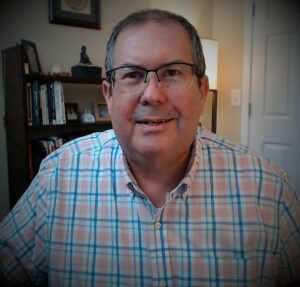
L. Gordon Brewer Jr., LMFT |Podcast Host – Gordon has spent his career in helping professions as a licensed therapist, counselor, trainer, and clergy person. He has worked with 100’s of people in teaching them the how to better manage their emotions through self-care and the practices of kindness and compassion. Follow us on Instagram and Facebook . And be sure to subscribe to our newsletter.

